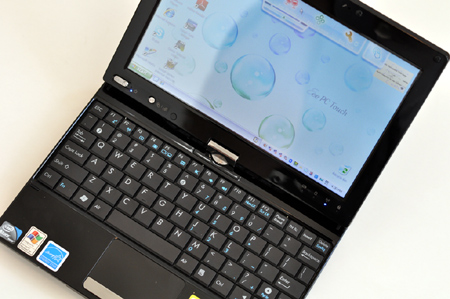Asus Eee PC T91 Swivel-Screen Tablet Netbook
By and large, Asus does a commendable job of disguising the fact that this is really just a miniaturized Tablet PC. At first glance, you'd never know that it's any different than a conventional netbook, but upon lifting the lid up, the gaps underneath of the bezel begin to give it away somewhat. Still, for a Tablet, the T91 looks great. We appreciated the front-mounted multicard reader, but we would've preferred to see the headphone jack there as well. Also, the rear-mounted VGA port may be unorthodox, but it's actually great--after all, who really wants to see a huge VGA port sticking out of their machine? By having it in the rear, it keeps it out of the user's view most of the time.
Unlike non-touchscreen Eee PCs, this one has a stylus tucked away in the right front corner, and while we found our fingertips to work just fine on the screen, we appreciate the inclusion. We do feel as if another USB port could've been shoved in somewhere, as giving us only two just feels like the mainboard engineers weren't trying hard enough.
Upon opening the lid up, we had mixed reactions. On the positive side, the trackpad here is easily one of the best we've ever used on a netbook. The texture is just incredible, and the right/left click button has the perfect amount of travel. We sorely wish it supported multi-finger gestures, but at least it will scroll up/down Web pages if you run your finger up or down the far right side.
The keyboard is definitely squashed, but did you really expect anything different from an 8.9" netbook? There isn't a lot of real estate to play with here, and we think Asus did the very best they could with this keyboard. You'll definitely have more errors on this than you will with more "normal sized" keyboards, but the keys are well positioned and can definitely be "learned" with time. We were shocked to see how small the keyboard was, and -- at least initially -- we were really dreading the typing experience; much to our surprise, it wasn't so bad after a few hours of getting adjusted.
We will say, however, that the keyboard is entirely too "mushy." Particularly on the center keys, you can actually feel the entire keyboard flex downward when typing normally. It may not bother some folks, but the unnatural give (and unevenness, across keys) really annoyed our fingers. Then there's the matter of the power button, which is actually a slider switch on the lower-left side of the LCD bezel. It's not very practical to turn the machine on in our experience, and oftentimes we had to slide it a few times for it to register our command. Minor, but annoying.
Finally, there's the display. We fully understand that putting a capacitive touchscreen in here may have been impossible given the cost and size constraints of a netbook, but the soft, mushy resistive screen just feels inferior. If you've ever played with a PocketPC PDA from half a decade ago, you know the soft, sinking feeling we're talking about. Responsiveness was actually pretty good, but from a build quality standpoint, we found the touch panel to be lacking in rigidity.















